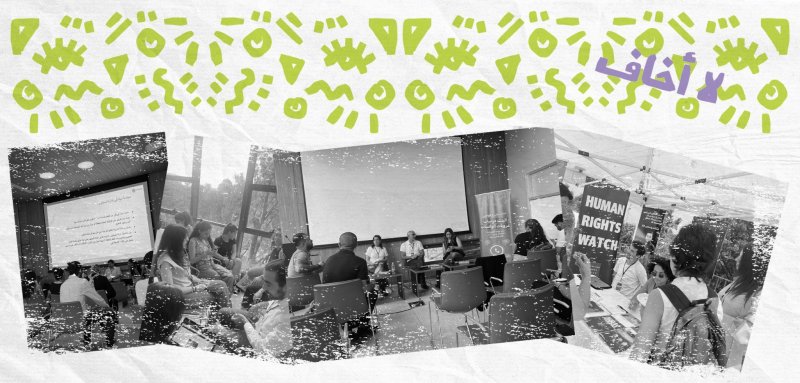Raseef22 hosted its first forum, Youth Not on the Margins: Towards Reclaiming the Narrative, to address mechanisms for fact-checking and news verification, challenge digital censorship, and engage communities through participatory methods in news production. The forum took place on May 22nd and 23rd, 2024, at the Asfari Institute for Civil Society and Citizenship at the American University of Beirut.
Youth and students from various Lebanese universities participated in the forum. They formed working groups to discuss the rights of marginalized social groups in the context of "gender freedoms and freedom of sexual orientation," "physical and intellectual disabilities and access to services," "sexual and reproductive health and rights," "refugees, asylum and equity in the health sector," and "combating the stigma surrounding drug use."
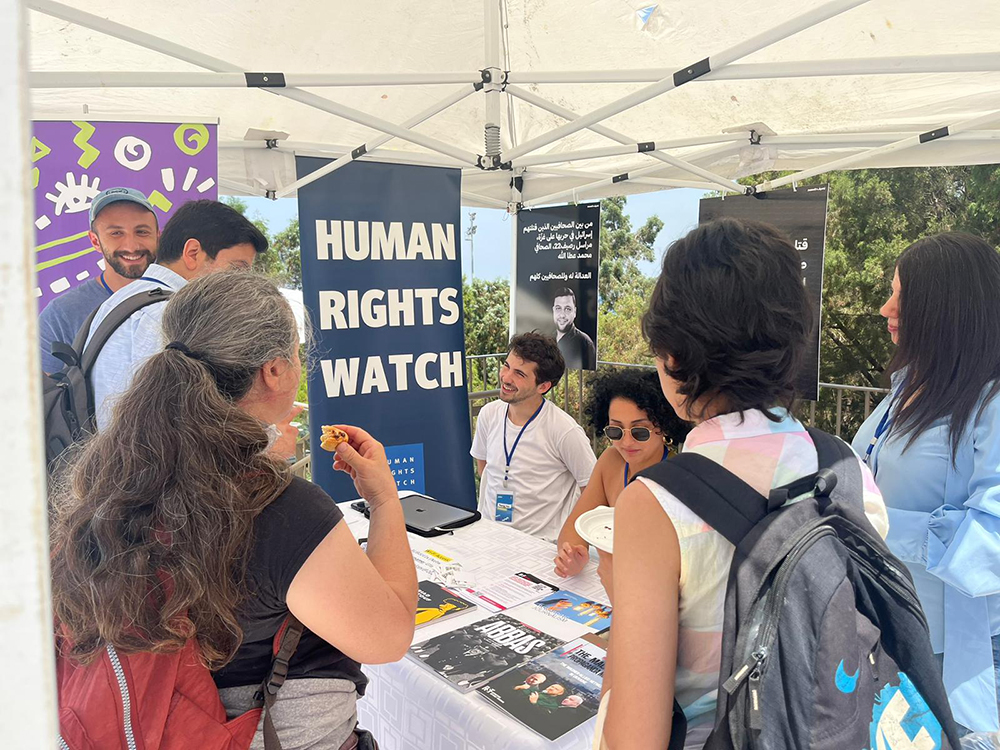 The Raseef22 Beirut Forum included a booth hosted by Human Rights Watch and Journalists Without Borders
The Raseef22 Beirut Forum included a booth hosted by Human Rights Watch and Journalists Without Borders
The first session, Censored Fruit is the Sweetest: Combatting Algorithms and Breaking the Cycle, focused on addressing the challenges of algorithms and closed-loop systems. The session began with Samar ElHusseiny, Programs Officer at the Egyptian Human Rights Forum (EHRF), discussing content management policies. She said: “The problem is not the existence of policies to protect digital content, but rather the mechanism for approving and developing them. Every social space needs a regulatory system, not restriction. These policies must be flexible and adaptable to change, while taking into account the rights of individuals and preventing deviations without limiting freedoms.”
Following ElHusseiny, a team of experts from SMEX, a non-profit that advocates for and advances human rights in digital spaces across West Asia and North Africa, gave a presentation on the mechanisms used by social media platforms to block content or impose shadow bans through algorithmic manipulation. Abed Kataya, Media Program Manager at SMEX, stated, “Technology companies should respect human rights standards and freedom of expression wherever they operate, and should not prioritize financial profit over the rights of users, and even their lives, as happens in some cases.” He added that “the problem with removing content lies not only in algorithms, but in algorithms, policies, and even bias against certain people and certain groups.”
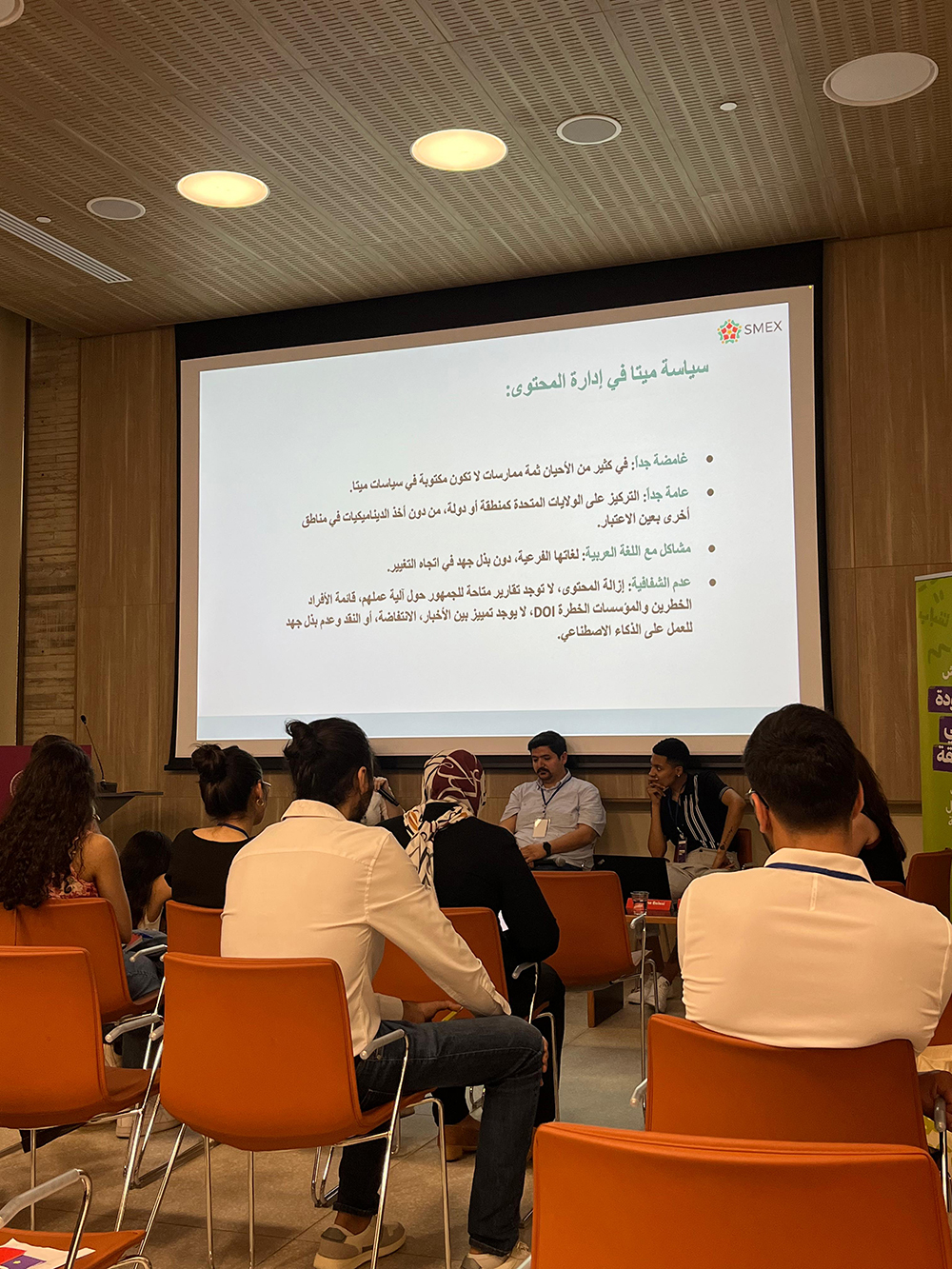 Raseef22 Beirut Forum on digital rights and freedoms, fake news, AI, content creation, deepfakes, and algorithms with journalists, Helem, Khateera, AFP, SMEX, Coffee Break Lebanon, ARIJ, AFCN, and EHRF, along with a student writing competition
Raseef22 Beirut Forum on digital rights and freedoms, fake news, AI, content creation, deepfakes, and algorithms with journalists, Helem, Khateera, AFP, SMEX, Coffee Break Lebanon, ARIJ, AFCN, and EHRF, along with a student writing competition
“The problem is not the existence of policies to protect digital content, but rather the mechanism for approving and developing them. Every social space needs a regulatory system, not restriction. These policies must be flexible and adaptable to change, while taking into account the rights of individuals and preventing deviations without limiting freedoms” – Samar ElHusseiny, Programs Officer at the Egyptian Human Rights Forum (EHRF), at Raseef22's Beirut forum
The second session discussed how to tackle misinformation and the role of artificial intelligence in spreading and combating it, under the title, "WhatsApp University: The role of WhatsApp group chats, fake news and AI in the spread of misinformation". During the session, Saja Mortada, Manager of the Arab Fact-Checkers Network (AFCN) led by ARIJ, indicated that the network focuses on four main areas in supporting fact-checking institutions worldwide: skills development, networking, protection, and innovation, saying that "these areas complement each other to ensure a successful fight against the spread of false and misleading information.”
Mortada further explained, “Artificial intelligence plays a significant role in the development of fact-checking, with the greatest proof being the AFCN's 'Chatbot', along with the 'Full Fact' tools for fact-checking in the Arabic language. At the same time, artificial intelligence complicates the fact-checking process and makes it difficult, particularly in detecting deepfakes and the its impact on the course of any election or crisis in any country."
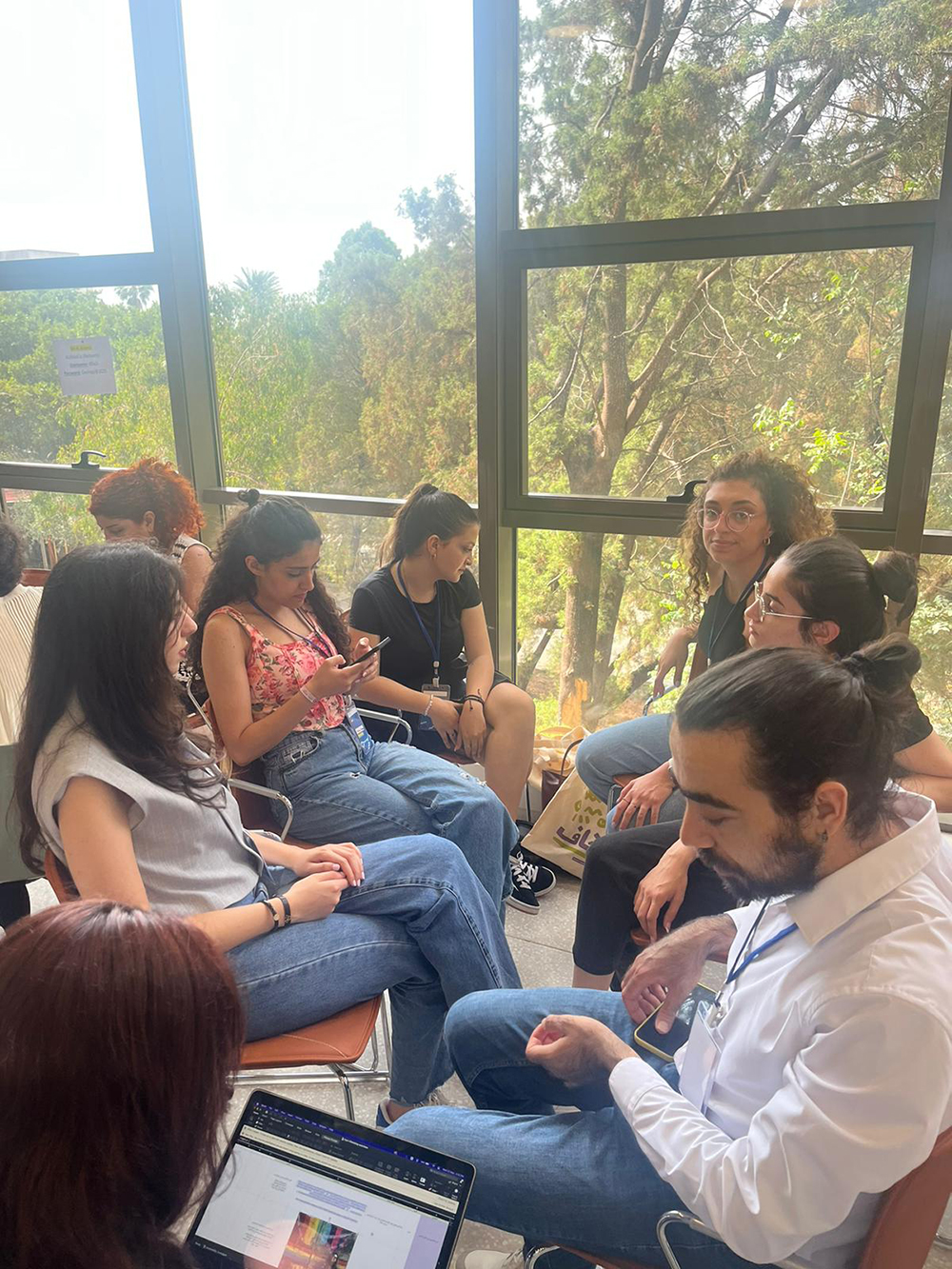 Raseef22 Beirut Forum on digital rights and freedoms, fake news, AI, content creation, deepfakes, and algorithms with journalists, Helem, Khateera, AFP, SMEX, Coffee Break Lebanon, ARIJ, AFCN, and EHRF, along with a student writing competition
Raseef22 Beirut Forum on digital rights and freedoms, fake news, AI, content creation, deepfakes, and algorithms with journalists, Helem, Khateera, AFP, SMEX, Coffee Break Lebanon, ARIJ, AFCN, and EHRF, along with a student writing competition
During the same session, the head of the Head of the Arabic-language digital investigation department in the Middle East and North Africa at Agence France-Presse (AFP), Khaled Soubeih, pointed out that fake news of various kinds is not exclusive to one region or limited to language in the world, adding, "Fact-checkers cannot win the battle against the promoters of lies and falsehoods. What can contain those who spread fake news is promoting a mindset of skepticism."
During the third session, the forum addressed how to present content that resonates with today's generation, with a number of journalists and content creators, under the title, "We’re in 2000 (and 24)!: Creating content for the rising generation". Shaza Yaman, a content creator at Blinx, said, "You can make useful and great content about literally anything. It all depends on how you present it."
Nathalie Masri and Nadyn Chalhoub, comedians and artistic directors of Coffee Break Lebanon, stated that, "Although keeping up with online trends may get you instant reach, likes, and momentary fame, finding your own online voice or identity will help you create a style or content that allows you to build an organic following or a community of followers that look forward to your next post."
"There is a need to clarify the difference between freedom of opinion and expression, and incitement to hatred and violence" – Journalist and researcher Roger Asfar at Raseef22's Beirut forum
As for the founder and creative director of Khateera platform, Amanda Abou Abdallah, she considered that "we should evolve by trial and error, and we shouldn't wait for perfection." She elaborated, "You should make the audience you target an important element in the process of creating your content. While you think about what you want to say, think about who you want to say it to."
Senior news correspondent, anchor, and talk show host at LBCI, Raneem Bou Khzam, also urged, "Before hitting the 'share' button, double-check the information in the content you are about to share from reliable sources. In a world full of misinformation, we must be champions of truth."
The fourth and final session was dedicated to discussing the representation of youth and marginalized groups in alternative media and their editorial recommendations, under the title, "Stories on Screens are Deeper in Reality: Representing youth and marginalized communities in alternative media".
During the session, journalist and researcher Roger Asfar spoke about the issue of Syrian refugees, saying, "There is a need to clarify the difference between freedom of opinion and expression, and incitement to hatred and violence. Perhaps it is the difference between nationalism and racism, and retraining many journalists on the basics of avoiding false and misleading information, and obtaining information from its original sources, instead of promoting discourse that should be prohibited legally and ethically."
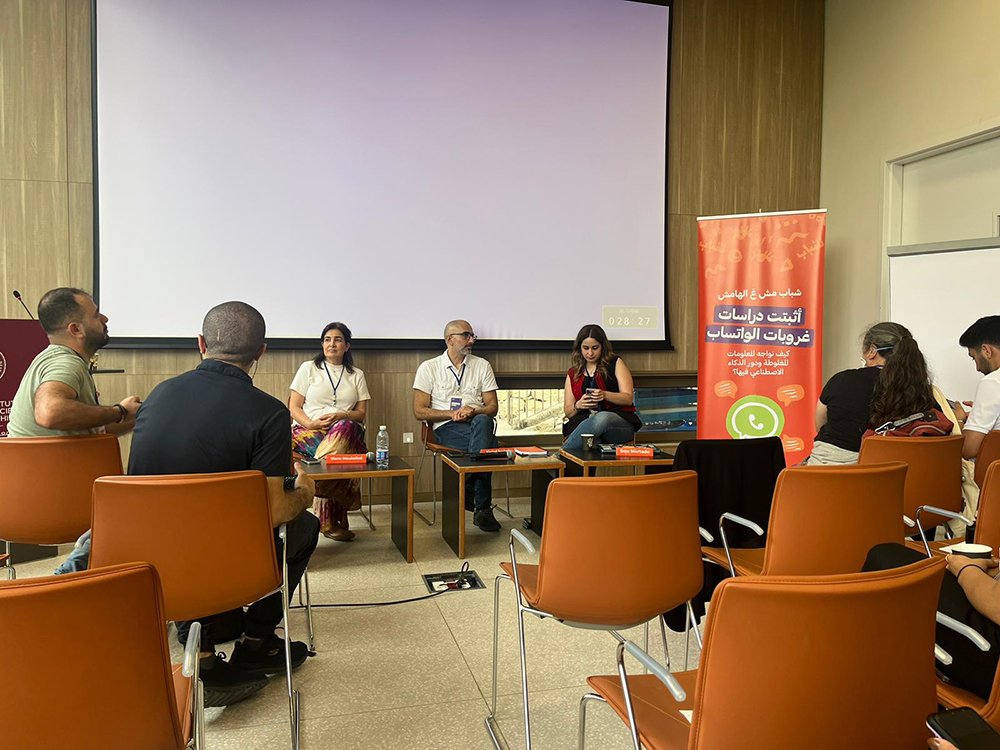 Raseef22 Beirut Forum on digital rights and freedoms, fake news, AI, content creation, deepfakes, and algorithms with journalists, Helem, Khateera, AFP, SMEX, Coffee Break Lebanon, ARIJ, AFCN, and EHRF, along with a student writing competition
Raseef22 Beirut Forum on digital rights and freedoms, fake news, AI, content creation, deepfakes, and algorithms with journalists, Helem, Khateera, AFP, SMEX, Coffee Break Lebanon, ARIJ, AFCN, and EHRF, along with a student writing competition
"You should make the audience you target an important element in the process of creating your content. While you think about what you want to say, think about who you want to say it to" – Amanda Abou Abdallah, founder and creative director of Khateera platform, at Raseef22's Beirut forum
Doumit Azzi, the communications coordinator at Helem, the first LGBTQ+ rights non-governmental organization in the Arab world, stated, "Members of the LGBTQ+ community face difficulty in finding a space that allows them to express themselves and share their experiences. Part of the media has adopted a misleading rhetoric targeting the LGBTQ+ community by creating or promoting negative and unrealistic stereotypes."
Dr. Nadia Badran, the executive director and president of the Social Workers' Syndicate in Lebanon, spoke about drug users, stating, "The media can amplify the voice of those who have no voice and are marginalized in society, and can achieve social justice. The media has power and a responsibility. It is a tool for supporting social issues and highlighting them without reinforcing the stereotypes that often accompany them."
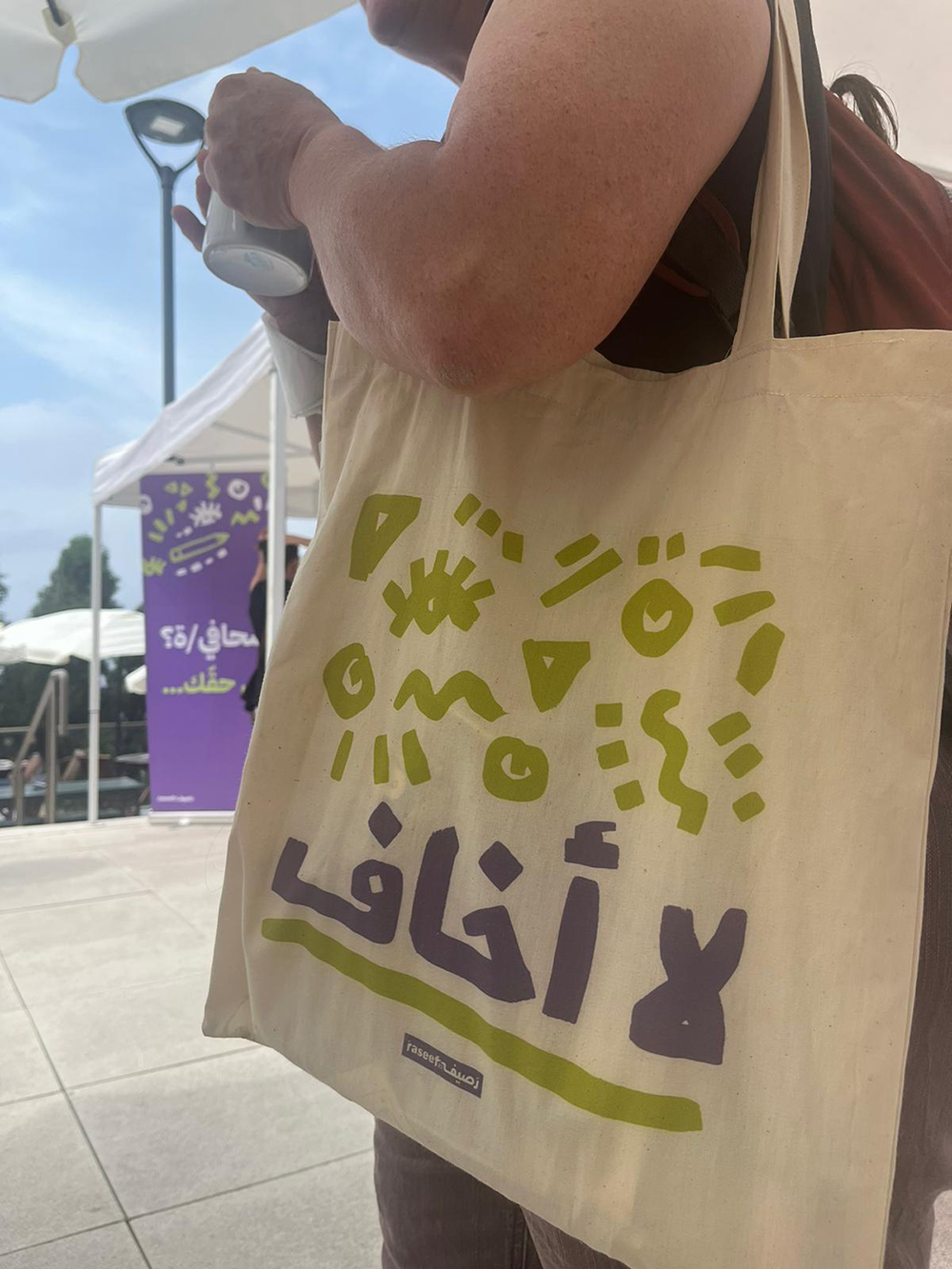 Raseef22 Beirut Forum on digital rights and freedoms, fake news, AI, content creation, deepfakes, and algorithms with journalists, Helem, Khateera, AFP, SMEX, Coffee Break Lebanon, ARIJ, AFCN, and EHRF, along with a student writing competition
Raseef22 Beirut Forum on digital rights and freedoms, fake news, AI, content creation, deepfakes, and algorithms with journalists, Helem, Khateera, AFP, SMEX, Coffee Break Lebanon, ARIJ, AFCN, and EHRF, along with a student writing competition
Additionally, non-violence and human rights activist Nabih Samarani spoke about people with disabilities, saying, "There is a problem related to the expressions used to refer to us. In English, we use the term 'people with disabilities,' while in Arabic, different expressions are used, such as 'mu’aq', 'mu'awwaq', and 'people with special needs', whereas the correct term is 'people with disabilities'."
"The media can amplify the voice of those who have no voice and are marginalized in society, and can achieve social justice. The media has power and a responsibility. It is a tool for supporting social issues and highlighting them without reinforcing the stereotypes that often accompany them" — Dr. Nadia Badran, executive director and president of the Social Workers' Syndicate in Lebanon, at Raseef22's Beirut forum
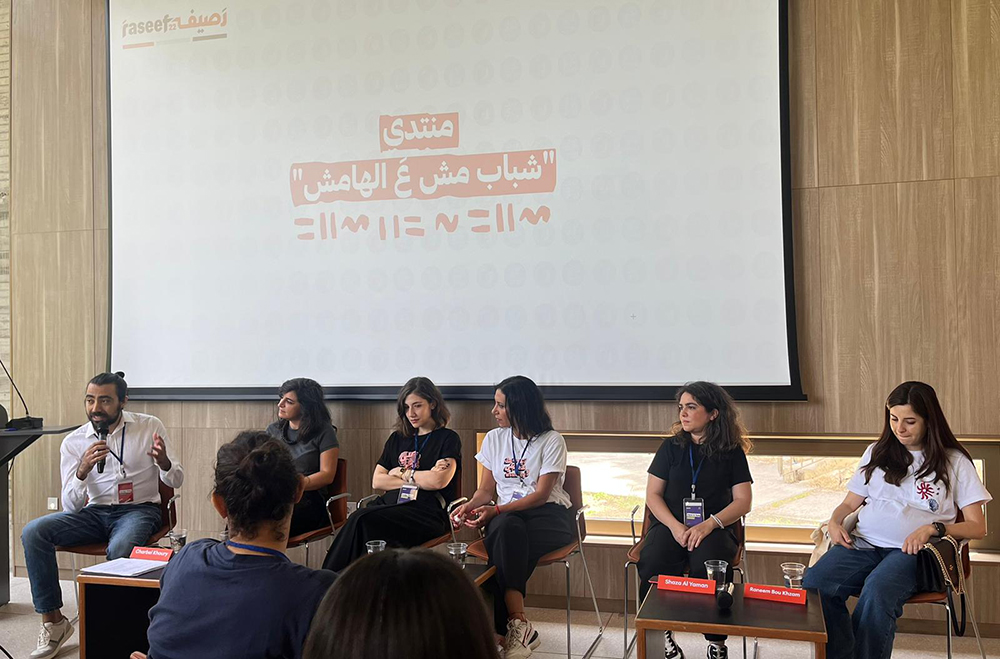 Raseef22 Beirut Forum on digital rights and freedoms, fake news, AI, content creation, deepfakes, and algorithms with journalists, Helem, Khateera, AFP, SMEX, Coffee Break Lebanon, ARIJ, AFCN, and EHRF, along with a student writing competition
Raseef22 Beirut Forum on digital rights and freedoms, fake news, AI, content creation, deepfakes, and algorithms with journalists, Helem, Khateera, AFP, SMEX, Coffee Break Lebanon, ARIJ, AFCN, and EHRF, along with a student writing competition
In conclusion, the results of the "Youth: Not on the Margins" student writer competition were announced. More than 30 students from various media colleges and faculties in a number of Lebanese universities participated in the writing contest. The competition included training sessions conducted by journalist Hassan Abbas. Four entries reached the final stage, and the first place was awarded to Amani Shaaban, a student at the Lebanese University, for her article titled: "We fear difference.. The daily hell of the LGBTQ+ community". The winner received a financial grant of 1,000 US dollars. The judging committee also recommended publishing the four finalist reports after scoring them based on how they presented the issue and their writing style. The judging committee consisted of journalists and writers Hassan Abbas, Saada Allaw, Sahar Mandour, Ayman Sharrouf, and Mohanad Hajj Ali.
Raseef22 is a not for profit entity. Our focus is on quality journalism. Every contribution to the NasRaseef membership goes directly towards journalism production. We stand independent, not accepting corporate sponsorships, sponsored content or political funding.
Support our mission to keep Raseef22 available to all readers by clicking here!
Interested in writing with us? Check our pitch process here!
